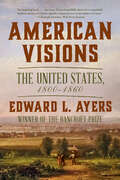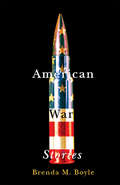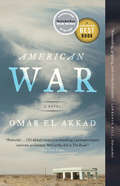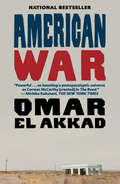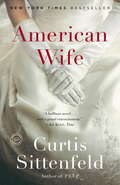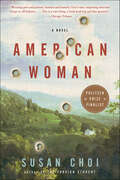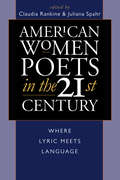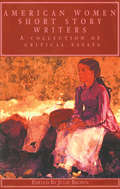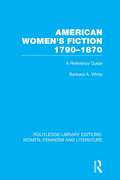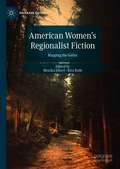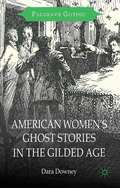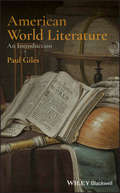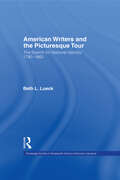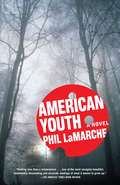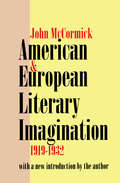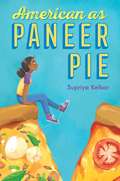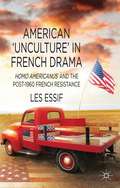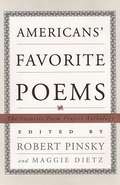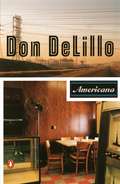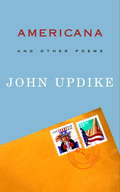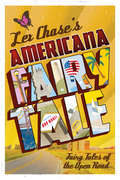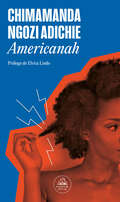- Table View
- List View
American Visions: The United States, 1800-1860
by Edward L. Ayers“An inspiring book.… American Visions beautifully shows how remarkably resilient dreams of a better republic remained even in the darkest of times.” —Christoph Irmscher, Wall Street Journal A revealing history of the formative period when voices of dissent and innovation defied power and created visions of America still resonant today. With so many of our histories falling into dour critique or blatant celebration, here is a welcome departure: a book that offers hope as well as honesty about the American past. The early decades of the nineteenth century saw the expansion of slavery, Native dispossession, and wars with Canada and Mexico. Mass immigration and powerful religious movements sent tremors through American society. But even as the powerful defended the status quo, others defied it: voices from the margins moved the center; eccentric visions altered the accepted wisdom, and acts of empathy questioned self-interest. Edward L. Ayers’s rich history examines the visions that moved Frederick Douglass, Margaret Fuller, the Native American activist William Apess, and others to challenge entrenched practices and beliefs. So, Lydia Maria Child condemned the racism of her fellow northerners at great personal cost. Melville and Thoreau, Joseph Smith and Samuel Morse all charted new paths for America in the realms of art, nature, belief, and technology. It was Henry David Thoreau who, speaking of John Brown, challenged a hostile crowd "Is it not possible that an individual may be right and a government wrong?" Through decades of award-winning scholarship on the Civil War, Edward L. Ayers has himself ventured beyond the interpretative status quo to recover the range of possibilities embedded in the past as it was lived. Here he turns that distinctive historical sensibility to a period when bold visionaries and critics built vigorous traditions of dissent and innovation into the foundation of the nation. Those traditions remain alive for us today.
American Voices: Literature
by Perfection LearningProvide your students a diverse set of texts, both classic and contemporary to probe relevant themes, develop literary analysis skills, and generate lively discussions. <p><p> The American Voices anthology supports common eleventh grade literature requirements and engages students using a literary lens for every selection. The Interactive Edition provides power digital tools to ensure text comprehension, build close reading skills, and increase collaboration.
American War Stories (War Culture)
by Brenda M. BoyleAmerican War Stories asks readers to contemplate what traditionally constitutes a “war story” and how that constitution obscures the normalization of militarism in American culture. The book claims the traditionally narrow scope of “war story,” as by a combatant about his wartime experience, compartmentalizes war, casting armed violence as distinct from everyday American life. Broadening “war story” beyond the specific genres of war narratives such as “war films,” “war fiction,” or “war memoirs,” American War Stories exposes how ingrained militarism is in everyday American life, a condition that challenges the very democratic principles the United States is touted as exemplifying.
American War: A Novel
by Omar El AkkadAn audacious and powerful debut novel: a second American Civil War, a devastating plague, and one family caught deep in the middle -- a story that asks what might happen if America were to turn its most devastating policies and deadly weapons upon itself.Sarat Chestnut, born in Louisiana, is only six when the Second American Civil War breaks out in 2074. But even she knows that oil is outlawed, that Louisiana is half underwater, that unmanned drones fill the sky. And when her father is killed and her family is forced into Camp Patience for displaced persons, she quickly begins to be shaped by her particular time and place until, finally, through the influence of a mysterious functionary, she is turned into a deadly instrument of war. Telling her story is her nephew, Benjamin Chestnut, born during war as one of the Miraculous Generation and now an old man confronting the dark secret of his past -- his family's role in the conflict and, in particular, that of his aunt, a woman who saved his life while destroying untold others.
American War: A Novel
by Omar El AkkadNATIONAL BESTSELLER • A second American Civil War, a devastating plague, and one family caught deep in the middle—this gripping debut novel asks what might happen if America were to turn its most devastating policies and deadly weapons upon itself. From the author of What Strange Paradise"Powerful ... as haunting a postapocalyptic universe as Cormac McCarthy [created] in The Road." —The New York TimesSarat Chestnut, born in Louisiana, is only six when the Second American Civil War breaks out in 2074. But even she knows that oil is outlawed, that Louisiana is half underwater, and that unmanned drones fill the sky. When her father is killed and her family is forced into Camp Patience for displaced persons, she begins to grow up shaped by her particular time and place. But not everyone at Camp Patience is who they claim to be. Eventually Sarat is befriended by a mysterious functionary, under whose influence she is turned into a deadly instrument of war. The decisions that she makes will have tremendous consequences not just for Sarat but for her family and her country, rippling through generations of strangers and kin alike.
American Wife: A Novel
by Curtis SittenfeldOn what might become one of the most significant days in her husband's presidency, Alice Blackwell considers the strange and unlikely path that has led her to the White House-and the repercussions of a life lived, as she puts it, "almost in opposition to itself."A kind, bookish only child born in the 1940s, Alice learned the virtues of politeness early on from her stolid parents and small Wisconsin hometown. But a tragic accident when she was seventeen shattered her identity and made her understand the fragility of life and the tenuousness of luck. So more than a decade later, when she met boisterous, charismatic Charlie Blackwell, she hardly gave him a second look: She was serious and thoughtful, and he would rather crack a joke than offer a real insight; he was the wealthy son of a bastion family of the Republican party, and she was a school librarian and registered Democrat. Comfortable in her quiet and unassuming life, she felt inured to his charms. And then, much to her surprise, Alice fell for Charlie.As Alice learns to make her way amid the clannish energy and smug confidence of the Blackwell family, navigating the strange rituals of their country club and summer estate, she remains uneasy with her newfound good fortune. And when Charlie eventually becomes President, Alice is thrust into a position she did not seek-one of power and influence, privilege and responsibility. As Charlie's tumultuous and controversial second term in the White House wears on, Alice must face contradictions years in the making: How can she both love and fundamentally disagree with her husband? How complicit has she been in the trajectory of her own life? What should she do when her private beliefs run against her public persona?In Alice Blackwell, New York Times bestselling author Curtis Sittenfeld has created her most dynamic and complex heroine yet. American Wife is a gorgeously written novel that weaves class, wealth, race, and the exigencies of fate into a brilliant tapestry-a novel in which the unexpected becomes inevitable, and the pleasures and pain of intimacy and love are laid bare.Praise for American Wife"Curtis Sittenfeld is an amazing writer, and American Wife is a brave and moving novel about the intersection of private and public life in America. Ambitious and humble at the same time, Sittenfeld refuses to trivialize or simplify people, whether real or imagined." -Richard Russo"What a remarkable (and brave) thing: a compassionate, illuminating, and beautifully rendered portrait of a fictional Republican first lady with a life and husband very much like our actual Republican first lady's. Curtis Sittenfeld has written a novel as impressive as it is improbable."-Kurt AndersenFrom the Hardcover edition.
American Woman: A Novel
by Susan Choi“Susan Choi…proves herself a natural—a writer whose intelligence and historical awareness effortlessly serve a breathtaking narrative ability. I couldn’t put American Woman down, and wanted when I finished it to do nothing but read it again.” —Joan DidionA novel of impressive scope and complexity, “American Woman is a thoughtful, meditative interrogation of…history and politics, of power and racism, and finally, of radicalism.” (San Francisco Chronicle), perfect for readers who love Emma Cline’s novel, The Girls.On the lam for an act of violence against the American government, 25-year-old Jenny Shimada agrees to care for three younger fugitives whom a shadowy figure from her former radical life has spirited out of California. One of them, the kidnapped granddaughter of a wealthy newspaper magnate in San Francisco, has become a national celebrity for embracing her captors' ideology and joining their revolutionary cell."A brilliant read...astonishing in its honesty and confidence,” (Denver Post) American Woman explores the psychology of the young radicals, the intensity of their isolated existence, and the paranoia and fear that undermine their ideals.
American Women Poets in the 21st Century: Where Lyric Meets Language
by Juliana Spahr Claudia RankineA thought-provoking mix of poetry, creative manifesto and criticism.
American Women Short Story Writers: A Collection of Critical Essays (Wellesley Studies in Critical Theory, Literary History and Culture #Vol. 1737)
by Julie BrownThis collection of original and classic essays examines the contributions that female authors have made to the short story. The introductory chapter discusses why genre critics have ignored works by women and why feminist scholars have ignored the short story genre. Subsequent chapters discuss early stories by such authors as Lydia Maria Child and Rose Terry Cooke. Others are devoted to the influences (race, class, sexual orientation, education) that have shaped women's short fiction through the years. Women's special stylistic, formal and thematic concerns are also discussed in this study. The final essay addresses the ways our contemporary creative-writing classes are stifling the voices of emerging young female authors. The collection includes an extensive five-part bibliography.
American Women's Fiction, 1790-1870: A Reference Guide (Routledge Library Editions: Women, Feminism and Literature)
by Barbara A. WhiteAn annotated bibliography on women who wrote fiction in the US during the period 1790-1870. The first part is an annotated list of sources that discuss women's fiction in the period and women authors born before 1840 who published before 1870. The second part is an alphabetical list of the approximately 325 19th century writers who meet those criteria. There are indexes by pseudonym, editor, and subject. The sources provide information not only about the individual authors but also about the history of criticism and literary politics, especially women's place in the American literary canon.
American Women's Regionalist Fiction: Mapping the Gothic (Palgrave Gothic)
by Monika Elbert Rita BodeAmerican Women’s Regionalist Fiction: Mapping the Gothic seeks to redress the monolithic vision of American Gothic by analyzing the various sectional or regional attempts to Gothicize what is most claustrophobic or peculiar about local history. Since women writers were often relegated to inferior status, it is especially compelling to look at women from the Gothic perspective. The regionalist Gothic develops along the line of difference and not unity—thus emphasizing regional peculiarities or a sense of superiority in terms of regional history, natural landscapes, immigrant customs, folk tales, or idiosyncratic ways. The essays study the uncanny or the haunting quality of “the commonplace,” as Hawthorne would have it in his introduction to The House of the Seven Gables, in regionalist Gothic fiction by a wide range of women writers between ca. 1850 and 1930. This collection seeks to examine how/if the regionalist perspective is small, limited, and stultifying and leads to Gothic moments, or whether the intersection between local and national leads to a clash that is jarring and Gothic in nature.
American Women’s Ghost Stories in the Gilded Age
by Dara DowneyThis book shows just how closely late nineteenth-century American women's ghost stories engaged with objects such as photographs, mourning paraphernalia, wallpaper and humble domestic furniture. Featuring uncanny tales from the big city to the small town and the empty prairie, it offers a new perspective on an old genre.
American World Literature: An Introduction (Textxet: Studies In Comparative Literature Ser. #47)
by Paul GilesA scholarly review of American world literature from early times to the postmodernist era American World Literature: An Introduction explores how the subject of American Literature has evolved from a national into a global phenomenon. As the author, Paul Giles – a noted expert on the topic – explains, today American Literature is understood as engaging with the wider world rather than merely with local or national circumstances. The book offers an examination of these changing conceptions of representation in both a critical and an historical context. The author examines how the perception of American culture has changed significantly over time and how this has been an object of widespread social and political debate. From examples of early American literature to postmodernism, the book charts ways in which the academic subject areas of American Literature and World Literature have converged – and diverged – over the past generations. Written for students of American literature at both undergraduate and postgraduate levels and in all areas of historical specialization, American World Literature offers an authoritative guide to global phenomena of American World literature and how this subject has undergone crucial changes in perception over the past thirty years.
American Writers and the Approach of World War II, 1935-1941
by Ichiro TakayoshiIchiro Takayoshi's book argues that World War II transformed American literary culture. From the mid-1930s to the American entry into World War II in 1941, preeminent figures from Ernest Hemingway to Reinhold Neibuhr responded to the turn of the public's interest from the economic depression at home to the menace of totalitarian systems abroad by producing novels, short stories, plays, poems, and cultural criticism in which they prophesied the coming of a second world war and explored how America could prepare for it. The variety of competing answers offered a rich legacy of idioms, symbols, and standard arguments that was destined to license America's promotion of its values and interests around the world for the rest of the twentieth century. Ambitious in scope and addressing an enormous range of writers, thinkers, and artists, this book is the first to establish the outlines of American culture during this pivotal period.
American Writers and the Picturesque Tour: The Search for National Identity, 1790-1860 (Garland Studies in 19th Century American Literature #Vol. 7)
by Beth L. LueckExplores a beloved genreEven before the age of the Romantics, travel literature was a favorite genre of English and American writers and readers. After the War of 1812, Americans' passion for scenic beauty inspired them to take the picturesque tour of America as well as going to Europe for the requisite Grand Tour. The written American version of the popular British tour in various guidebooks helped shape the literature of the new nation as nearly every major writer of the first half of the 19th century contributed to it from Poe, who provided several comic pieces, and Irving to Thoreau, for whom the tour symbolized moral and spiritual growth, and Margaret Fuller.Offers new perspectivesAmerican writers adapted the picturesque to express their nationalistic sentiments; picturesque discourse offered a flexible series of conventions that enable writers to celebrate the places, people, and legends that set America apart. This volume demonstrates the vital role of this genre in the formation of national literary taste and national culture and offers fresh and exciting perspectives on the topic. Includes index. Also includes maps.
American Youth: A Novel
by Phil LamarcheIn this taut and powerful novel, a young teenager is confronted by a terrible moral dilemma following a firearms accident at his home. Coerced by his mother to lie about his role in the incident, he finds he has nonetheless earned the admiration of a sinister group of boys at his school - calling themselves 'American Youth', they subscribe to a twisted notion of traditional, puritanical values. As he gets sucked into their orbit, and entangled with the girlfriend of the group's leader, he struggles to hold on to a sense of right and wrong. Set in a New England town riven by social and ideological tensions - as newcomers encroach on an old rural culture - this is a classic portrait of a boy's rites of passage in an America ill at ease with itself.
American and European Literary Imagination
by John McCormickWestern culture is composed of a subtle and complex mixture of influences: religious, philosophical, linguistic, political, social, and sociological. American culture is a particular strain, but unless European antecedents and contemporary leanings are duly noted, any resulting history is predestined to provincialism and distortion. In his account of American literature during the period 1919 to 1932, McCormick deals with the extraordinary work of artists who wrested imaginative order from a world in which the abyss was never out of sight.McCormick's volume is intended as a critical, rather than encyclopedic history of literature on both sides of the Atlantic between the end of World War I and the political and social crises that arose in the 1930s. Although he emphasizes American writers, the emergence of a vital and distinctly modern American literature is located in the cultural encounter with Europe and the rejection of national bias by the major figures of the period.McCormick deals with Gertrude Stein and the mythology of the "lost generation," the tensions and ambivalences of traditionalism and modernity in the work of Sherwood Anderson and F. Scott Fitzgerald, the effect and qualities of Hemingway's style as compared to that of Henry de Montherlant, and the provincial iconoclasm of Sinclair Lewis juxtaposed with the more telling satire of Italo Svevo. The formal innovations in the work of John Dos Passos, E.E. Cummings, and William Faulkner, the poetic revolution against cultural parochialism and genteel romanticism is given extensive consideration with regard to the work of T.S. Eliot, Ezra Pound, Wallace Stevens, William Carlos Williams, and Marianne Moore are also discussed. The concluding chapters discuss literary and social criticism and assess the influence of psychoanalysis, philosophical pragmatism, and radical historiography on the intellectual climate of the period.Teachers and students in English and American Literature, American History, and Comparative Literature, and the general reader interested in the writing of the period, may gain new insights from these valuations, devaluations, and re-evaluations.
American as Paneer Pie
by Supriya KelkarAn Indian American girl navigates prejudice in her small town and learns the power of her own voice in this brilliant gem of a middle grade novel full of humor and heart, perfect for fans of Front Desk and Amina&’s Voice.As the only Indian American kid in her small town, Lekha Divekar feels like she has two versions of herself: Home Lekha, who loves watching Bollywood movies and eating Indian food, and School Lekha, who pins her hair over her bindi birthmark and avoids confrontation at all costs, especially when someone teases her for being Indian. When a girl Lekha&’s age moves in across the street, Lekha is excited to hear that her name is Avantika and she&’s Desi, too! Finally, there will be someone else around who gets it. But as soon as Avantika speaks, Lekha realizes she has an accent. She&’s new to this country, and not at all like Lekha. To Lekha&’s surprise, Avantika does not feel the same way as Lekha about having two separate lives or about the bullying at school. Avantika doesn&’t take the bullying quietly. And she proudly displays her culture no matter where she is: at home or at school. When a racist incident rocks Lekha&’s community, Lekha realizes she must make a choice: continue to remain silent or find her voice before it&’s too late.
American ‘Unculture’ in French Drama
by Les EssifA book about the role America plays in the French imagination, as it translates to the French stage. Informed by a rich variety of Western cultural scholarship, Essif examines two dozen post-1960 works representing some of the most innovative dramaturgy of the last half century, including works by Gatti, Obaldia, Cixous, Koltes, and Vinaver.
American's Favorite Poems: The Favorite Poem Project Anthology
by Robert Pinsky Maggie DietzThis anthology of 200 poems embodies Robert Pinsky's commitment to discovering America's beloved poetry, his special undertaking as Poet Laureate of the United States.
Americana
by Don DelilloHis first novel, Don DeLillo's Americana passionately articulates the neurotic landscape of contemporary American life through a disintegrating embodiment of the American dream. Prosperous, good-looking and empty inside, 28-year-old advertising executive David Bell appears on the surface to have everything. But he is a man on the brink of losing his sanity. Trapped in a Manhattan office with soulless sycophants as his only company, he makes an abrupt decision to leave New York for America's mid-west. His plan: to film the small-town lives of ordinary people and make contact with the true heart of his homeland. But as Bell puts his films together in his hotel room, he grows increasingly convinced that there is no heart to find. Modern America has become a land that has reached the end of its reel. . . Don DeLillo (b. 1936) was born and raised in New York City. Americana (1971), his first novel, announced the arrival of a major literary talent, and the novels that followed confirmed his reputation as one of the most distinctive and compelling voices in late-twentieth-century American fiction. DeLillo's comic gifts come to the fore in White Noise (1985), which won the National Book Award, Underworld (1997), hailed by Martin Amis as 'the ascension of a great writer', Cosmopolis (2003), adapted into a film by David Cronenberg, due to be released later this year, and Falling Man (2007), a novel about the aftereffects of the 9/11 terrorist attacks in New York. If you enjoyed Americana, you might like DeLillo's Libra, also available in Penguin Modern Classics. 'He's a writer who, once you read him, makes you want to read everything he's done'Martin Amis, Sunday Times 'Witty, clever and incisive . . . a marvellously realized plot'Time Out 'Nearly every sentence of Americana rings true . . . DeLillo is a man of frightening perception'Joyce Carol Oates
Americana
by John UpdikeJohn Updike's first collection of verse since his Collected Poems, 1953-1993 brings together fifty-eight poems, three of them of considerable length. The four sections take up, in order: America, its cities and airplanes; the poet's life, his childhood, birthdays, and ailments; foreign travel, to Europe and the tropics; and, beginning with the long "Song of Myself," daily life, its furniture and consolations. There is little of the light verse with which Mr. Updike began his writing career nearly fifty years ago, but a light touch can be felt in his nimble manipulation of the ghosts of metric order, in his caressing of the living textures of things, and in his reluctance to wave goodbye to it all.From the Hardcover edition.
Americana Fairy Tale (Screw-up Princess and Skillful Huntsman Trilogy #1)
by Lex ChaseScrew-up Princess and Skillful Huntsman Trilogy: Book OneA Fairy Tales of the Open Road NovelModern fairy-tale princess Taylor Hatfield has problems. One: he's a guy. Two: his perfect brother Atticus is the reincarnation of Snow White. Three: Taylor has no idea which princess he is supposed to be. Four: Taylor just left his prince (a girl) at the altar. Despite his enchanted lineage, Taylor is desperate to find his Happily Ever After away from magic, witches, and stuffy traditions. Regrettably, destiny has other plans for him. Dammit. When word reaches Taylor that Idi the Witchking has captured Atticus, Taylor is determined to save his brother. He enlists the help of rakish and insufferable Corentin Devereaux, likewise of enchanted lineage. A malicious spell sends Taylor and Corentin on a road trip through the kitschy nostalgia of roadside Americana. To save Atticus, they must solve the puzzles put forth by Idi the Witchking. As they struggle, Taylor and Corentin's volatile partnership sparks a flash of something more. But princesses have many enemies, and Taylor must keep his wits about him because there's nothing worse than losing your heart... or your head.2015 Rainbow Awards Best Gay Fantasy Romance Runner-Up Best Gay Book Runner-Up
Americanah
by Chimamanda Ngozi AdichieWINNER 2013 - National Book Critics Circle Award for Fiction FINALIST 2014 - Baileys Women's Prize for Fiction FINALIST 2014 - Andrew Carnegie Medal for Fiction LONGLISTED 2015 - International IMPAC Dublin Literary Award A searing new novel, at once sweeping and intimate, by the award-winning author of Half of a Yellow Sun: a story of love and race centered around a man and woman from Nigeria who seemed destined to be together--until the choices they are forced to make tear them apart. Ifemelu--beautiful, self-assured--left Nigeria 15 years ago, and now studies in Princeton as a Graduate Fellow. She seems to have fulfilled every immigrant's dream: Ivy League education; success as a writer of a wildly popular political blog; money for the things she needs. But what came before is more like a nightmare: wrenching departure from family; humiliating jobs under a false name. She feels for the first time the weight of something she didn't think about back home: race. Obinze--handsome and kind-hearted--was Ifemelu's teenage love; he'd hoped to join her in America, but post 9/11 America wouldn't let him in. Obinze's journey leads him to back alleys of illegal employment in London; to a fake marriage for the sake of a work card, and finally, to a set of handcuffs as he is exposed and deported. Years later, when they reunite in Nigeria, neither is the same person who left home. Obinze is the kind of successful "Big Man" he'd scorned in his youth, and Ifemelu has become an "Americanah"--a different version of her former self, one with a new accent and attitude. As they revisit their shared passion--for their homeland and for each other--they must face the largest challenges of their lives. Spanning three continents, entering the lives of a richly drawn cast of characters across numerous divides, Americanah is a riveting story of love and expectation set in today's globalized world.
Americanah
by Chimamanda Ngozi AdichieUna original historia sobre la inmigración en Estados Unidos desde el punto de vista de una estudiante de literatura nigeriana. Lagos, mediados de los noventa. En el marco de una dictadura militar y en una Nigeria que ofrece poco o ningún futuro, Ifemelu y Obinze, dos adolescentes atípicos, se enamoran apasionadamente. Como gran parte de su generación, saben que antes o después tendrán que dejar el país. Obinze siempre ha soñado con vivir en Estados Unidos, pero es Ifemelu quien consigue el visado para vivir con su tía en Brooklyn y estudiar en la universidad. Mientras Obinze lucha contra la burocracia para reunirse con Ifemelu, ella se encuentra en una América donde nada es como se imaginaba, comenzando por la importancia del color de su piel. Todas sus experiencias, desgracias y aventuras conducen a una única pregunta: ¿acabará convirtiéndose en una «americanah»? Americanah, que recoge el término burlón con que los nigerianos se refieren a los que vuelven de Estados Unidos dándose aires, es una historia de amor a lo largo de tres décadas y tres continentes, la historia de cómo se crea una identidad al margen de los dictados de la sociedad y sus prejuicios. Reseñas:«Confirma el virtuosismo, la empatía sin límites y la punzante agudeza social de Adichie.»Dave Eggers «Hay algunas novelas que cuentan una gran historia y otras que consiguen que cambies la manera que tienes de ver el mundo. Americanah, de Chimamanda Ngozi Adichie, consigue las dos cosas.»Elisabeth Day, The Guardian «Americanah es esa cosa rara en la ficción literaria contemporánea: una exuberante historia de amor que también es una crítica social penetrante y divertida [...]. Adichie escribe con perspicacia.»Vogue
